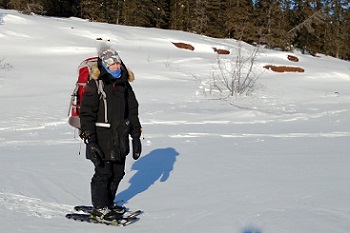
© Iris Catholique
Winter safety
Thaıdene Nëné National Park Reserve
Winter can be a hazardous time for backcountry wilderness travel. You are responsible for your own safety and should file a travel plan with a friend or family member whether heading out for the day or on a multi-day trip.
Emergencies
Visitors are encouraged to carry satellite phones or personal locator beacons as cell phones are out of range in most areas of the park. In the event of an emergency, you should be prepared for lengthy delays in search and rescue response times due to weather conditions and/or the availability of both aircraft and rescue personnel.
Parks Canada 24 Hour Emergency Dispatch
1-780-852-3100
Be prepared!

In the backcountry, your safety is your personal responsibility. While many hazards exist, the risk of personal injury you face can be minimized by taking reasonable precautions. Caution and self-reliance are essential, along with a knowledge of natural hazards, experience in avoiding them and successfully dealing with them when they happen. Pick trips that reflect your level of ability.
A few tips:
- Travel with caution - You may encounter overflow (water under the snow layer), thin ice or open water on any of the lakes, rivers or creeks in the area
- Never travel alone – groups of two or more have much greater success dealing with emergencies
- File a trip plan - let someone at home know your plans, even for a day trip.
- Do not overexert yourself; the possibility of hypothermia is greatest when the body is tired and cold.
- Prevent snow-blindness - wear sunglasses.
- Carry emergency equipment: fire starter, spare clothing, a repair kit, a survival kit, and a first aid kit.
- Carry a satellite phone or personal locator beacon
- Dress for the conditions you expect and be prepared for weather changes, Wear layers of clothing, adding or shedding layers as needed.
- Check weather forecasts.
- Carry a satellite phone or personal locator beacon – cell phones only have limited coverage near Łutsël K’e.
Hypothermia
Hypothermia is the lowering of the interior body temperature, and is caused by exposure to the cold, aggravated by wetness, wind and personal exhaustion. Hypothermia can be fatal.
Symptoms
Hypothermia symptoms can be recognized in an individual by:
- Uncontrollable fits of shivering
- Slurred speech
- Stumbling
- Loss of coordination
- Difficulty performing simple tasks
- Behaviour may also change: a good-natured person may begin to grumble and complain
Prevention is the best cure:
- Layer clothing appropriate for the weather – remove and add as necessary
- Protect your head from heat loss - wear a hat
- Don't eat snow - Your body has to melt and warm the snow resulting in a drop in body temperature
- If needed start a fire, drink warm beverages (not alcoholic), eat chocolate or other high calorie food, put on dry clothes and get into a sleeping bag/tent if required
Emergency treatment
- If possible move the patient to medical assistance quickly
- If this isn't possible, move the victim to a shelter, remove the victim's clothes, place a naked person on each side of the patient and keep all three well covered
- If the patient is conscious, give them warm liquids (not alcoholic)
Frostbite
Frostbite is the freezing of the body tissues. There is a sensation of numbness, the skin turns white, yellow-white and mottled blue-white and the area becomes cold and insensitive to touch. The nose, ears, cheeks and chin are usually parts of the body to be affected, but more severe cases of frostbite involve the hands and feet.
Treatment
Minor frostbite:
- Add more clothing to the affected area and shelter from the cold
- Rewarm the area with body heat, but do not massage
Serious frostbite:
- Prevent further freezing
- Don't thaw the frozen area if there is a danger of refreezing
- If freezing can be prevented, rewarm the area by immersing it in water, starting at a comfortable hand temperature and increasing the temperature gradually
- Get medical aid as quickly as possible
- Keep the area clean at all times, as risk of infection is great
- Date modified :